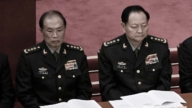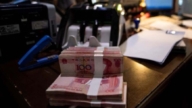【新唐人2011年6月7日讯】美国国会众议员史密斯( Chris Smith) 形容中国现今的人权状况“糟透了”,有必要采取行动。他向国会提案,禁止签发入境签证给侵犯人权的中国官员,及他们的直系亲属,希望借此向中共领导层施压。关心中国人权的各界人士都寄予期待,希望法案的通过。
《法新社》报导,来自新泽西州的美国国会共和党众议员克里斯.史密斯,是众议院外交事务委员会人权小组委员会主席,他在6月4号提出了一项议案。
他表示,中国目前的人权情况糟透了,中共现在明目张胆践踏人权的程度是自从1989年“六四”以来人们不曾见过的,这项议案是要提醒中共领导人不要压迫自己的人民。
根据议案,参与虐待中国维权人士、律师、记者、以及暴力镇压藏人、维吾尔人和蒙古人等少数民族的中共官员及其直系亲属,将被美国拒绝入境;同时,参与强迫堕胎、走私人口或强制遣返北韩难民的中共官员,也将被列入限制入境美国的黑名单。
曾在八九学运期间,担任北京高校学生对话代表团的召集人项小吉,向《自由亚洲电台》表示,自89年六四民运镇压以来,在22年当中,中共以一种近乎黑社会的流氓手段,来对付异议人士、对付维权人士,他说,从这个意义上讲,中国的人权状况是严重的恶化。
对于美国国会众议员克里斯•史密斯的提案,项小吉评论说(六四学运领袖):“如果说美国率先在这方面有立法措施的话,那么也许能够影响到国际社会其他的一些机构也好,其他一些国家也好跟进。我觉得是一个进步的表现。”
而总部设在美国纽约的中文政论杂志《北京之春》主编胡平,也对这项提案表示支持,他说,中共以前常批评美国等西方国家把人权问题与经济等问题挂钩,其实中共政府一直是把经济和政治问题挂钩。
胡平(《北京之春》杂志主编):“照道理说,在这个体制下的官员,程度不等的都有侵犯人权、都做过这种事情,那么怎么样把这个责任弄得更明确一些、更集中一些,因此变得比较好认定,执行起来可行性就会大一些。如果得到通过的话,它是有相当的好处,我想它首先表明一种道义的立场,另外 对这种事情也多多少少有一定惩戒的作用。”
而网友在讨论区上,针对史密斯众议员提出的法案,多数表示赞同。有人认为:“好!必须与欧洲和日本联手。”同时,“再加一项:贪官。这样能为中国反腐出力!”
上个月(5月)中旬,史密斯众议员在人权小组听政会上强调,“中国(共)政府对那些接手人权案件,或是其他政治敏感问题案件的律师,和律师事务所的骚扰,呈现了绝对的上升趋势。”
中国知名异议人士魏京生也出席了这项听证会作证,他通过翻译说,“特别是过去半年来,中国的人权在迅速恶化。”
据了解,过去几个月,中共政权加紧压制艺术家与异议人士、维权律师和外国记者等。
新唐人记者周平、李月综合报导。
Motion to ban Rights Violators from Entering USA
US congressman Chris Smith said, the current
human rights situation in China is deplorable,
and actions need to be taken.
He proposed to ban the Chinese officials, who violate
human rights, and their families from entering the U.S.
People concerned with China’s human rights situation
hope that his proposal will be passed.
AFP reported that congressman Chris Smith,
chair of the House human rights subcommittee,
made this motion on June 4.
Smith said, human rights situation in China has been
the worst ever since 1989, as the regime (CCP) is
now flagrantly tramping on human rights.
The motion is to warn the CCP not to oppress people.
The motion proposes, Chinese officials that took part
in abusing rights activists, lawyers, journalists and
crackdowns on ethnic minorities, forced abortion,
human trafficking and Korean refugee repatriation
will be banned from entering the U.S.
The ban also applies to their immediate families.
Xiang Xiaoji, student leader during the Tiananmen
student movement, told RFA, since the crackdown,
the CCP used near-mafia means to suppress
Chinese dissidents and human rights activists.
From this perspective, the human rights
in China have severely deteriorated.
In regard to Congressman Smith’s motion, Xiang said:
Xiang: If the U.S. legislates this first,
it will influence the international community
and other countries or organizations will follow.
I believe it is a sign of progress.
Hu Ping, editor-in-chief of Beijing Spring magazine,
supports this motion. He said, the CCP often criticizes
the U.S. to link human rights to economic affairs,
but in fact, the CCP has been constantly doing so.
Hu Ping: Under the CCP’s regime, all the officials
have violated human rights to a varied degree.
Then, how to identify them, clearly define their actions,
and define what they are responsible for,
so as to better execute the punishment against them
and increase the chances of success in the execution?
This motion, if passed, will serve this purpose.
First of all, it stands on a moral ground,
punishing the human rights violators.
Many Chinese netizens in a forum supported the bill.
Some said: “Good! Must join forces with EU and Japan."
Some added: “Should include corrupt officials, too.
This can contribute to anti-corruption in China!"
In May, Smith stressed on a subcommittee hearing
that the harassment of the human rights lawyers
by the Chinese authorities has shown an absolute rise.
Well-known Chinese dissident Wei Jingsheng also
attended the hearing to testify, “in the past 6 months,
China’s human rights deteriorated rapidly".
In recent months, the CCP intensified its repression
of dissidents, rights lawyers and foreign journalists.
NTD reporters Zhou Ping and Li Yue






























